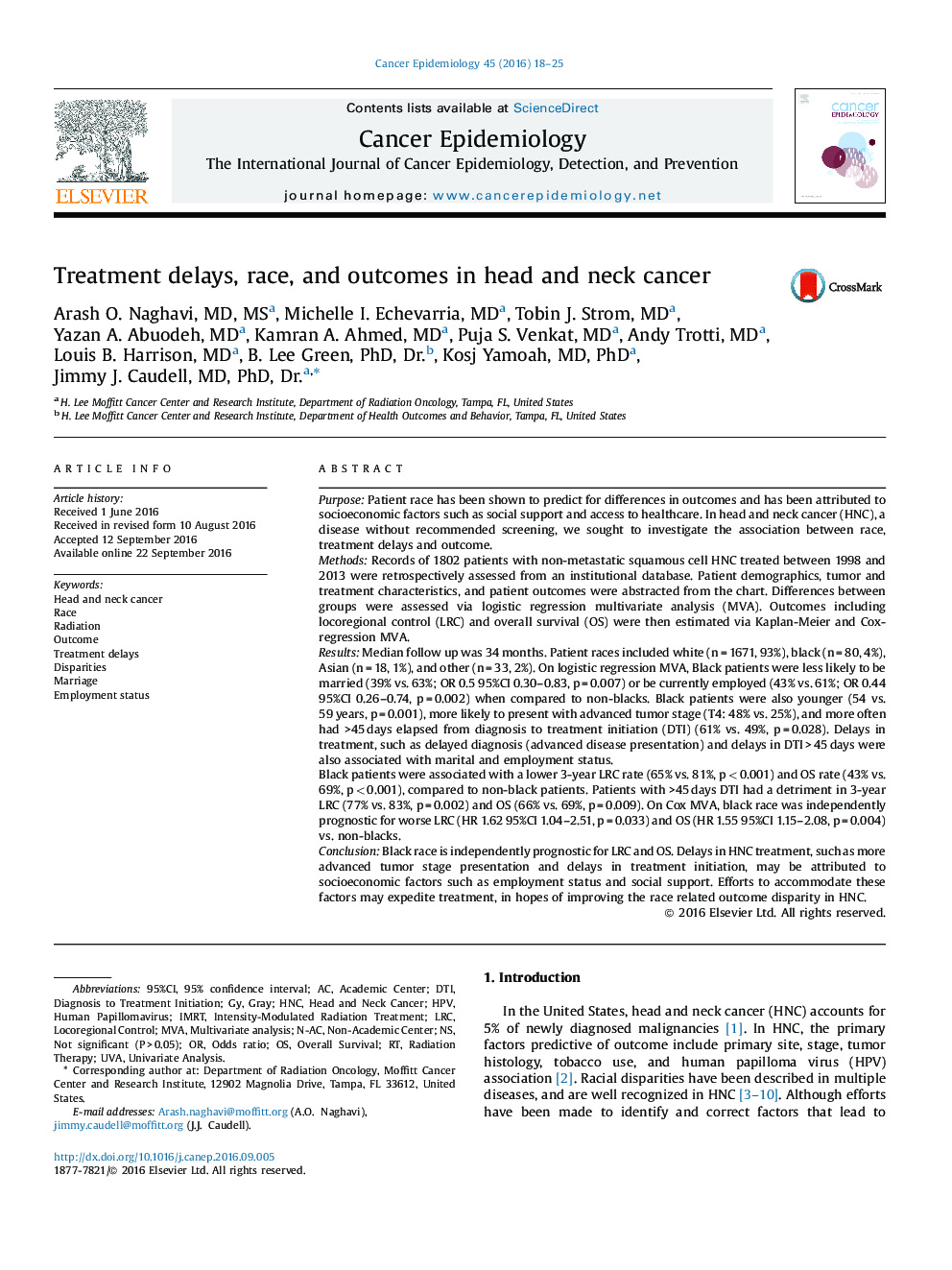| کد مقاله | کد نشریه | سال انتشار | مقاله انگلیسی | نسخه تمام متن |
|---|---|---|---|---|
| 5524826 | 1546530 | 2016 | 8 صفحه PDF | دانلود رایگان |
- Black patients more often presented with delays in diagnosis or advanced disease.
- Black patients more often had >45Â days elapsed from diagnosis to start of treatment.
- Patients with >45Â days DTI had a detriment in 3-year LRC and OS.
- Black race was independently associated with a lower 3-year LRC and OS rate.
- In HNC, there is an association between treatment delays, race, and outcome.
PurposePatient race has been shown to predict for differences in outcomes and has been attributed to socioeconomic factors such as social support and access to healthcare. In head and neck cancer (HNC), a disease without recommended screening, we sought to investigate the association between race, treatment delays and outcome.MethodsRecords of 1802 patients with non-metastatic squamous cell HNC treated between 1998 and 2013 were retrospectively assessed from an institutional database. Patient demographics, tumor and treatment characteristics, and patient outcomes were abstracted from the chart. Differences between groups were assessed via logistic regression multivariate analysis (MVA). Outcomes including locoregional control (LRC) and overall survival (OS) were then estimated via Kaplan-Meier and Cox-regression MVA.ResultsMedian follow up was 34 months. Patient races included white (n = 1671, 93%), black (n = 80, 4%), Asian (n = 18, 1%), and other (n = 33, 2%). On logistic regression MVA, Black patients were less likely to be married (39% vs. 63%; OR 0.5 95%CI 0.30-0.83, p = 0.007) or be currently employed (43% vs. 61%; OR 0.44 95%CI 0.26-0.74, p = 0.002) when compared to non-blacks. Black patients were also younger (54 vs. 59 years, p = 0.001), more likely to present with advanced tumor stage (T4: 48% vs. 25%), and more often had >45 days elapsed from diagnosis to treatment initiation (DTI) (61% vs. 49%, p = 0.028). Delays in treatment, such as delayed diagnosis (advanced disease presentation) and delays in DTI > 45 days were also associated with marital and employment status.Black patients were associated with a lower 3-year LRC rate (65% vs. 81%, p < 0.001) and OS rate (43% vs. 69%, p < 0.001), compared to non-black patients. Patients with >45 days DTI had a detriment in 3-year LRC (77% vs. 83%, p = 0.002) and OS (66% vs. 69%, p = 0.009). On Cox MVA, black race was independently prognostic for worse LRC (HR 1.62 95%CI 1.04-2.51, p = 0.033) and OS (HR 1.55 95%CI 1.15-2.08, p = 0.004) vs. non-blacks.ConclusionBlack race is independently prognostic for LRC and OS. Delays in HNC treatment, such as more advanced tumor stage presentation and delays in treatment initiation, may be attributed to socioeconomic factors such as employment status and social support. Efforts to accommodate these factors may expedite treatment, in hopes of improving the race related outcome disparity in HNC.
Journal: Cancer Epidemiology - Volume 45, December 2016, Pages 18-25
